Most cats love nothing better than basking in the sunshine, but the warmer months can bring some risks for our feline friends…
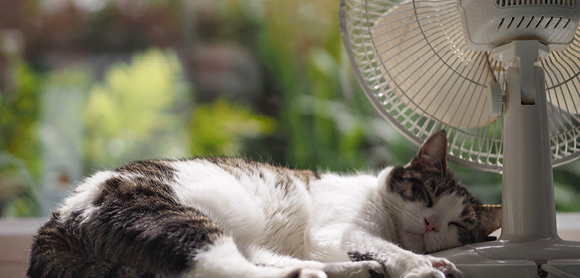
If you’re a cat owner, it’s important to make sure you’re up to speed on the season’s biggest health hazards. Dehydration, bites and stings, sunburn – there’s lots to consider as temperatures start to rise. Here’s our advice on how to keep cats cool and safe in summer.
Prevent cat dehydration
Domestic cats are thought to have originated from the African wildcat, which evolved to live in hot, dry climates, so they can generally handle the heat pretty well. Even so, they can still get heat stroke in hot weather and become dehydrated.
Other ailments – such as diabetes, vomiting or diarrhoea – can also cause dehydration. This, in turn, can lead to constipation, urinary tract infections and also kidney problems in more mature moggies.
Symptoms of cat dehydration can include:
- Panting
- Drooling
- A racing heartbeat
- Listlessness
- Sunken eyes
- Dry, tacky gums
Not sure if your cat is well-hydrated? The simplest way to prevent dehydration is to provide plenty of clean drinking water. Place several non-plastic water bowls around your home (and garden, too, if your cat spends time there), well away from food and litter trays.
If your cat prefers running water, offer drinks from the tap, or splash out on a cat water fountain. Providing wet cat food, not just dry kibble, can also increase your cat’s fluid intake.
If you’re worried about your cat, get them checked out by a vet. With a good cat insurance policy, you can ensure your pet gets the best possible care.
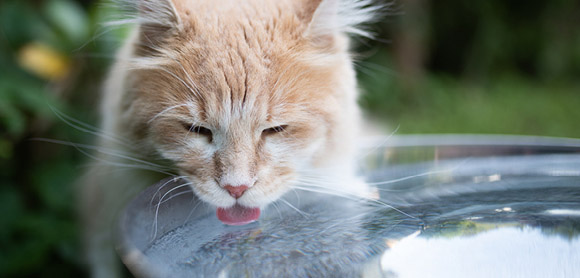
Create shaded spots for cooling cats down
If your cat likes to spend time outside, make sure there are plenty of shaded spots for them to enjoy under trees or shrubs. You could also hang blankets to make an easy chill-out space for cooling cats down.
Indoors, close curtains in rooms hit by direct sunlight to create plenty of shade, and consider using a fan to provide a cool breeze for your pets.
Try to encourage your cat to stay indoors during the hottest part of the day, instead letting them roam early in the morning and later in the evening when temperatures are cooler. It might be worth slightly adjusting meal times to encourage them to stay at home during hotter times.
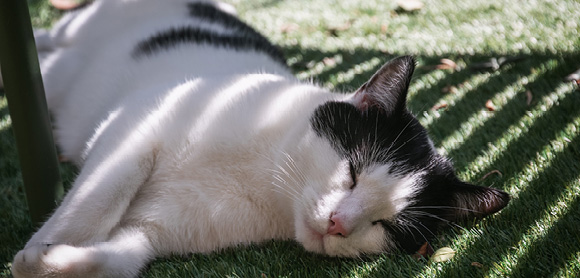
Give your cat ice treats
Ice cubes and iced cat treats can be a great way to both entertain and cool down a cat during summer.
Pop an ice cube on a hard floor and let your cat bat it around to cool their paws. You can also put an ice cube in their water bowl to keep the water chilled.
For cooling treats, add low-salt chicken stock or spring water from a tin of tuna to an ice cube tray or ice lolly mould and freeze it.
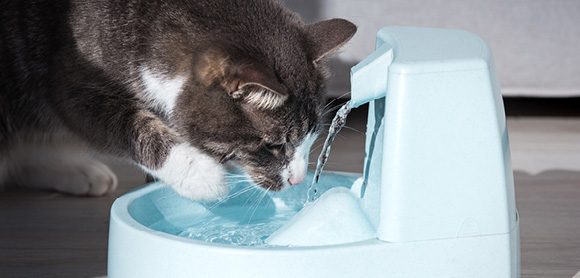
Grooming for summer
Long-haired cats particularly feel the heat, so make sure your cat is brushed daily to remove any excess fur that can trap heat. You can also try stroking your cat with damp hands to offer them some cooling relief.
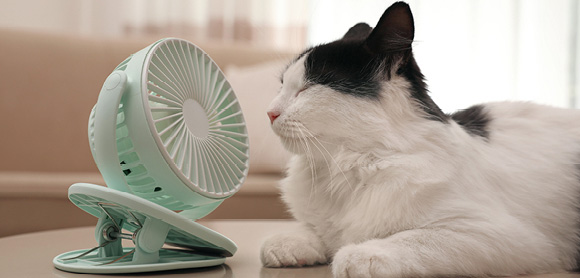
Watch out for cat sunburn
Just like us, felines can burn from prolonged exposure to the sun. A cat’s ears, nose and eyelids are prone to burning, especially if they are light in colour (think white cats with pink ears and noses), or have little or no fur.
If your cat insists on sunbathing, apply a special cat suncream (never a human sunscreen) on pale, thin-furred areas of skin. If your cat is prone to burning, consider keeping them indoors between 10am and 3pm.
As in humans, sun damage can cause skin cancer in cats. If you notice cat sunburn changing to black crusty patches, non-healing sores or unexplained scabs on your cat’s ears, nose or eyelids, get them checked out by a vet – these could be signs of a cancer called squamous cell carcinoma.
Other summer health concerns
Avoid feline heat hazards
Barbecues are a hot-weather hazard, with just-cooked food and hot coals having the potential to cause nasty burns. Keep your cat away from barbecue areas and never feed them tidbits, as you may increase their interest.
Look out for stings and burns
Just like us, cats can be bitten or stung by insects. Consult your vet immediately if your cat is stung inside their mouth or on the throat – where the swelling could constrict the airway – or if they collapse, vomit, struggle to breathe or show other signs of an allergic reaction.
Summer is also a peak time for parasites, so make sure your cat’s flea and worm treatments are up to date.
Plants that are poisonous to cats
Plants that could poison your pet include lilies, foxgloves, geraniums, hydrangeas, lily-of-the-valley, ragwort and rhubarb. Ensure you don’t have any of these in your garden, and do take your cat to the vet if you suspect they may have come into contact with any.
How do you help your cat keep cool in summer? Share your tips with other cat owners on Petplan’s Facebook page.